Iran nuclear deal: Turning point or transformation?
- Published
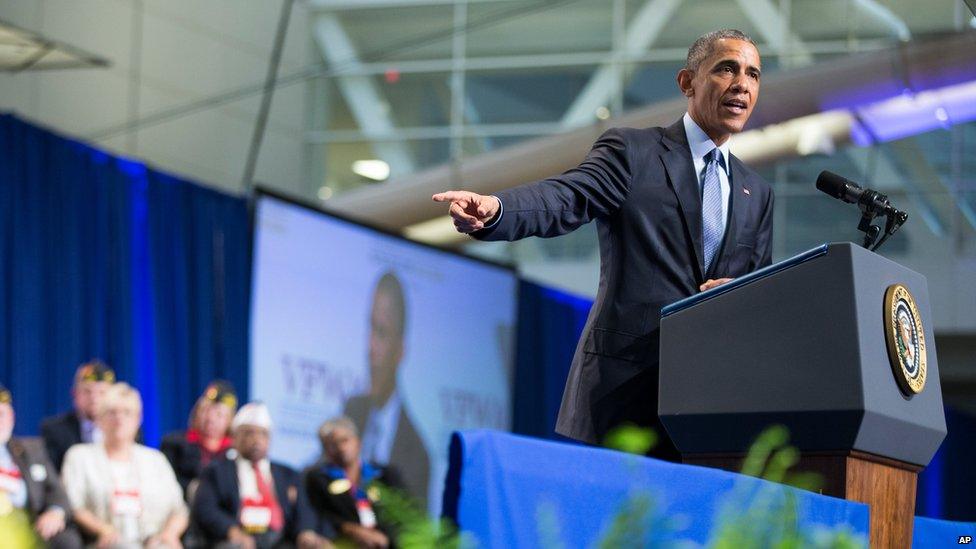
US President Barack Obama insists the deal will keep Iran from obtaining a nuclear weapon
Everyone agrees last week's landmark deal on Iran's nuclear programme marked a significant turning point.
This week, fundamental disagreements over what kind of turn it will take are centre stage in Washington, Tehran and many other capitals.
The document, external is now in the public domain, being carefully perused and passionately picked apart.
Battle lines are being drawn by lawmakers at the US Congress, who have 60 days to review the deal. In Iran, too, opponents and advocates in parliament are vociferously taking sides.
A growing swirl of reaction underlines that an agreement to significantly curb Iran's nuclear programme for 10 to 15 years in exchange for the lifting of sanctions - as momentous as that is - is being widely seen as much more than an arms control accord.
US President Barack Obama's constant refrain is that this deal "solves one particular problem, which is making sure they don't have a bomb".
But for many, it is also a moment laced with both political potential as well as peril. It could amount not just to a turning point, but a possible "transformation" of Iran and its place in the region and beyond.
'Fundamental shift'
The issue matters because even before the deal enters into force, many are asking what kind of Iran will there be a decade on, when many of the restrictions on its nuclear programme expire. Will an Iran emerge that has resolved its enmities with regional rivals and opened up at home, or a nuclear threshold state still be seen in many capitals as a threat?
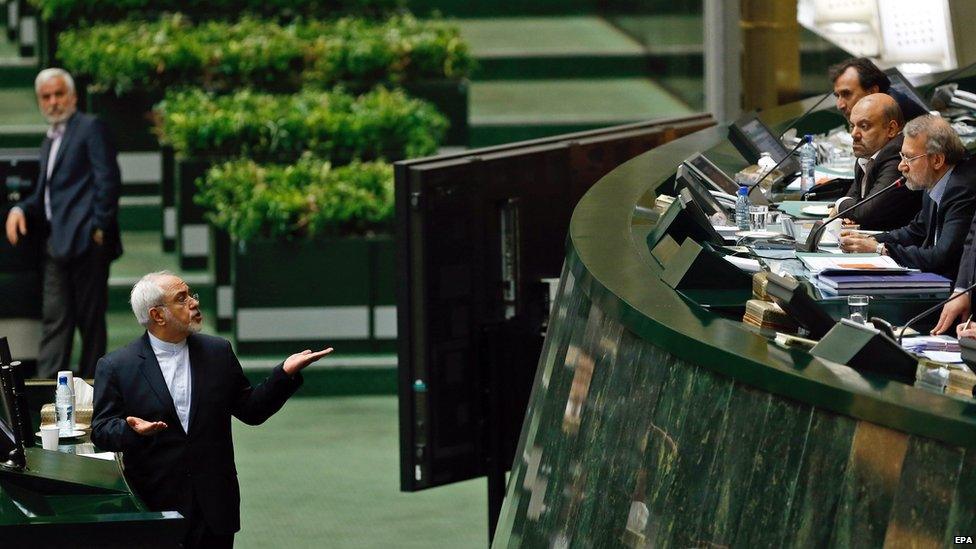
Iran's foreign minister noted that the country's right to enrich uranium had been recognised
For Iran, the change, at least on the level of significant symbols, is already in train.
This week began with the unanimous vote at the UN Security Council on a new resolution that paves the way for the eventual lifting of most international sanctions once Iran complies with its obligations under the nuclear agreement.
"Iran never got a fair treatment from #UNSC in the last 35 yrs," wrote Iran's Foreign Minister Mohammad Javad Zarif on Twitter, external. "Expect to see evidence of 'fundamental shift' promised in today's resolution."
For Mr Zarif, who was the permanent representative to the UN in New York when sanctions were first imposed by the Security Council in 2006, removing the stigma embodied in seven punishing UN resolutions was a crucial step towards recognition of Iran's rightful place at the world's top tables.
And for Iran's negotiators, there is more to it than that.
"Our biggest achievement is the stamp by the UN Security Council confirming [uranium] enrichment in Iran," Mr Zarif told the Iranian parliament on Tuesday when he urged MPs to back what he called a "balanced" deal.
The accord severely diminishes Iran's nuclear infrastructure, including its level of uranium enrichment. But it does not completely dismantle its programme or achieve the "zero enrichment" the deal's strongest critics in the US and Israel argue should still be the goal.
Must-see destination
But while a chorus of criticism rises, Iran's place on the geopolitical map is already changing. There is a diplomatic dash to visit this newest must-see destination.
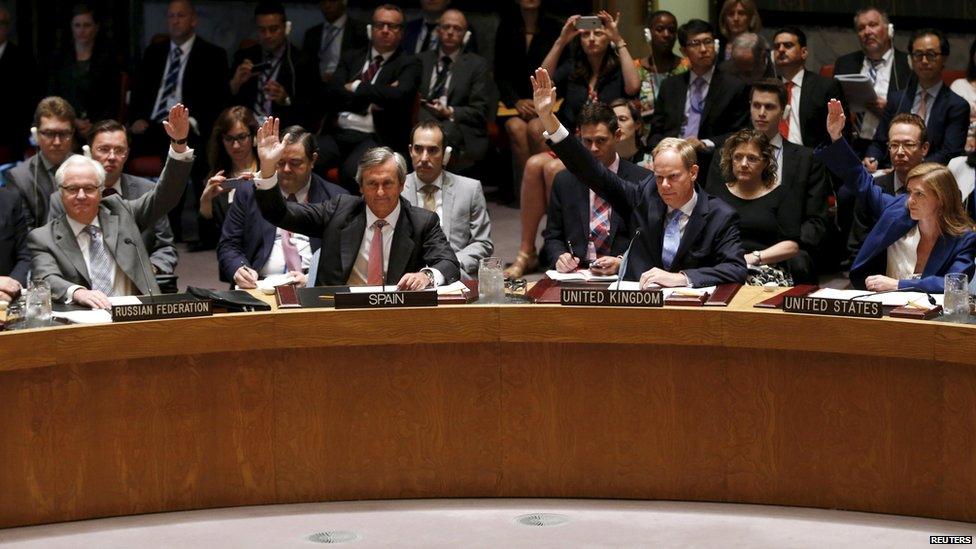
The 15-member UN Security Council unanimously endorsed the nuclear deal
No sooner was the news announced in Vienna then Germany's Vice-Chancellor and Economy Minister Sigmar Gabriel was on his way to Tehran, along with a 100-member delegation, including leading business executives, for the highest level visit in 13 years.
France's Foreign Minister Laurent Fabius is heading there next week with French firms keen to take advantage of a new opening.
On Monday, the European Union also approved the Iran deal, paving the way for the end of European sanctions. But restrictions linked to human rights issues will remain in place as well as an arms embargo which, under the nuclear accord, will not be lifted for the next five to eight years.
Europe's agenda is not just about the opportunities which now emerge but also the risks.
Mr Gabriel, mindful of his country's close ties to Israel, also used his visit to emphasise that "there can be no political questioning of the right of Israel to exist".
Neighbourhood watch
Regional worries are what drive the post-deal travel diaries of top American officials.
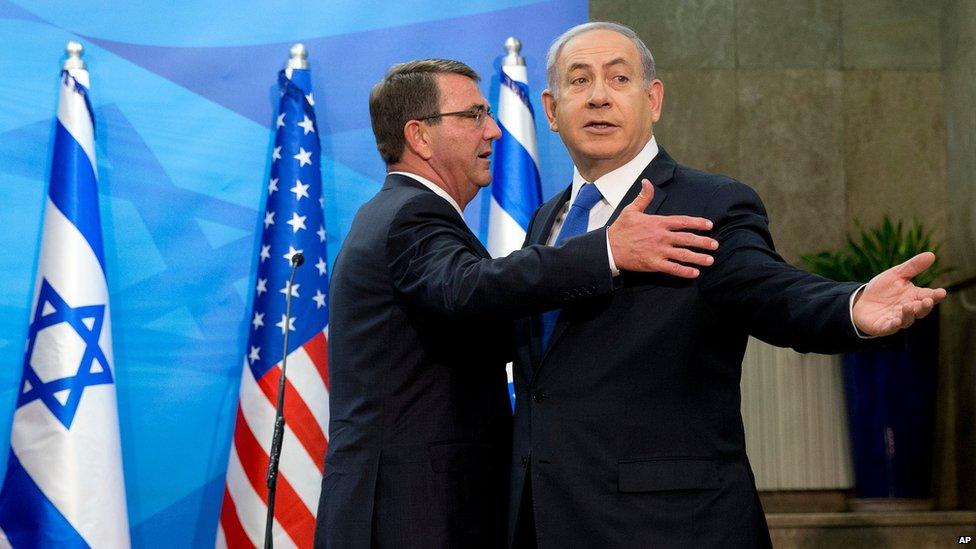
Israel's Prime Minister Benjamin Netanyahu called the deal an "historic mistake"
Defence Secretary Ashton Carter immediately set off for Israel with pledges of military support to an ally that has vowed to do all in its power to destroy the Iran deal.
Secretary of State John Kerry will soon be travelling to the Gulf to reassure Arab leaders of Washington's backing to help them "push back" against Iranian involvement in the region.
In public, Arab officials have given the deal a guarded welcome. In private many are sharply critical of what they view as the destabilising prospect of a resurgent Iran, freed from punishing sanctions with money to spend in what are seen as proxy wars in Syria, Iraq and Yemen.
"The choice belongs, now, to Iran," wrote UAE Foreign Minister Anwar Gargash in an op-ed for the Financial Times, external.
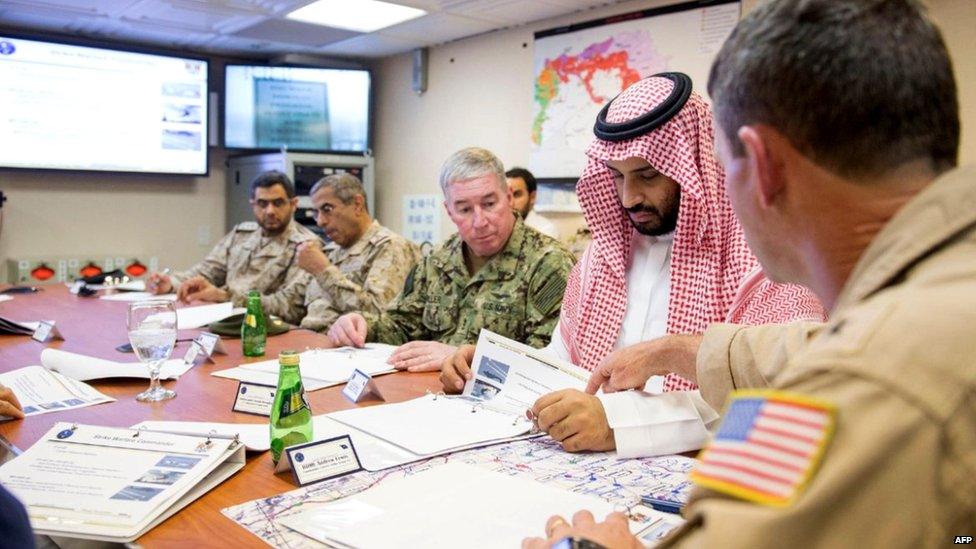
Saudi Arabia is believed to be considering its own nuclear options after the Iran deal
"On our list of priorities, our region is our highest priority," Mr Zarif told me in an interview in Vienna after the deal was announced.
But he placed the onus to start this new dialogue on the other side. "We call on our neighbours to set aside illusions about being able to portray Iran as a threat and start engaging seriously," he said.
If Iran can make a deal with the "The Great Satan", could it not do the same with regional heavyweights like Saudi Arabia, especially when threats like the rise of the so-called Islamic State pose dangers to all?
Poisonous sectarian fault lines in the region and conflicting political agendas on battlefields like Syria make a dialogue that much harder closer to home.
"We'll be watching Iran over the next year to see if this is a new face or just a new phase," is how one Arab ambassador put it.
Liberalisation hopes
Those hoping for change point to the possibilities offered in a keynote speech in April by Iran's Supreme Leader Ayatollah Ali Khamenei. "If the other side [the US] sets aside its bad behaviour, this will become a new experience for us that will tell us we can also negotiate with them about other issues," he said.
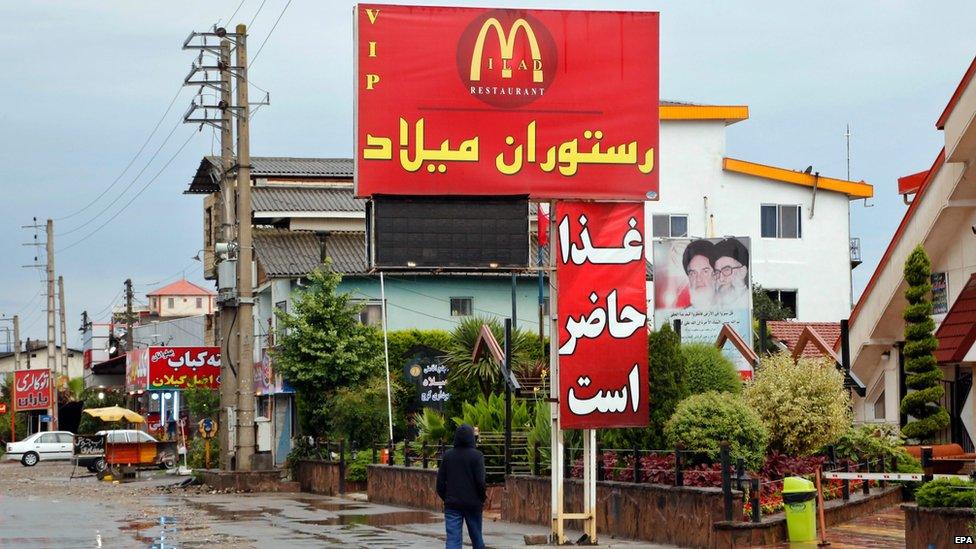
The world's largest companies are examining how they may be able to do business in Iran
Others hold up his more strident comments, external this week - in a speech marked by crowds chanting the old slogans of "Death to America and Israel"- that "US policies in the region are 180 degrees in contrast to Iran's policies".
Iranians who spilled onto the streets in joyous celebration last week see in this deal the prospect of greater political and personal freedoms.
Iranian business executives, relieved to once again have access to international markets, are pushing for economic reform and a crackdown on corruption to make this new opening even wider.
They know all too well that as their country moves forward, it could also lurch back as conservative elements retaliate against this greater engagement with the West.
"In the Middle East, a decade is an eternity," remarked former Israeli spy chief Efraim Halevy in an op-ed in Yedioth Ahronoth, external that urged Israeli officials not to make "a rush at Washington" to try to destroy the deal.
For now, negotiators for the world powers who bargained long and hard insist there is now one main question: "Does it stop Iran from producing a bomb?" Their answer is a resounding "yes". Iran's reply is that it never intended to produce one.
Many other questions will continue to be asked, and, like the main question, will soon be answered.